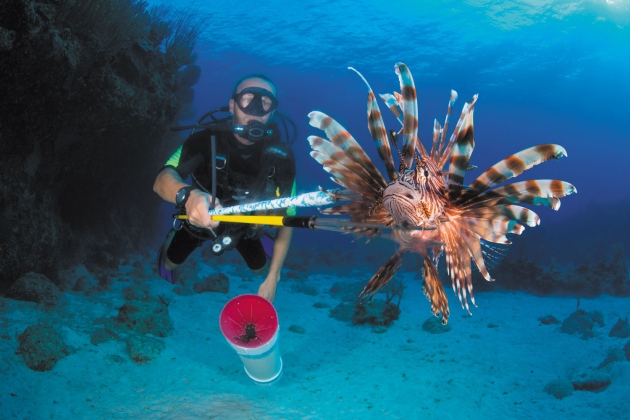
Lionfish culling in Florida. Photo: Alex Mustard/Naturepl.com
Lionfish are native to the Indo-Pacific, but due to the pet trade have invaded native habitats along the east coast of the U.S., the Caribbean, parts of the Gulf of Mexico and even on the other side of the Atlantic Ocean: the Mediterranean Sea. The island nation of Cyprus has begun a concerted private-public effort to cull lionfish populations that they’re witnessing in plague proportions destroying local ecosystems.
Lionfish Destroy Everything In Their Path: Lionfish don’t have natural predators and according to NOAA they can outcompete other ocean species, cause extinctions and alter habitats. The Guardian reported that as their numbers proliferate, so have fears that the fish pose the biggest ecological setback to ecosystems in the Mediterranean – which is already under pressure from pollution, tourism and over-exploitation. In the EU, Cyprus has become “the first line of defense” against the lionfish invasion.
Scientists helping to coordinate the effort in Cyprus are hopeful that the culling partnerships with the public can help substantially reduce the number of lionfish, as similar efforts have been successful in the Caribbean. Culls are expected to take place twice a month for two years and local fishermen have been encouraged to get involved.
Periklis Kleitou, a research fellow at the University of Plymouth, told The Guardian that “[lionfish] eat everything. Culling this invasive species is the only effective way to reduce their numbers and ensure marine-protected areas continue to regenerate.”
Why This Matters: As Professor Jason Hall-Spencer of the University of Plymouth explained, “Lionfish are the most damaging invasive fish we have ever seen. If action isn’t taken there will be lasting environmental and economic damage.” Lionfish are truly an unprecedented threat and pose a significant risk to marine biodiversity and local fisheries. Hopefully, the effort in Cyprus can slow their spread (which is being made worse by warming ocean waters) throughout the rest of the Mediterranean and create a replicable culling program for other places where the fish have been spotted like Turkey.
The Good News? Apparently as a firm, white flesh fish, lionfish are very tasty. Government officials in Cyrpus are hoping to create a market for culled lionfish to be eaten.
May 30, 2019 » invasive species, lionfish, mediterranean


